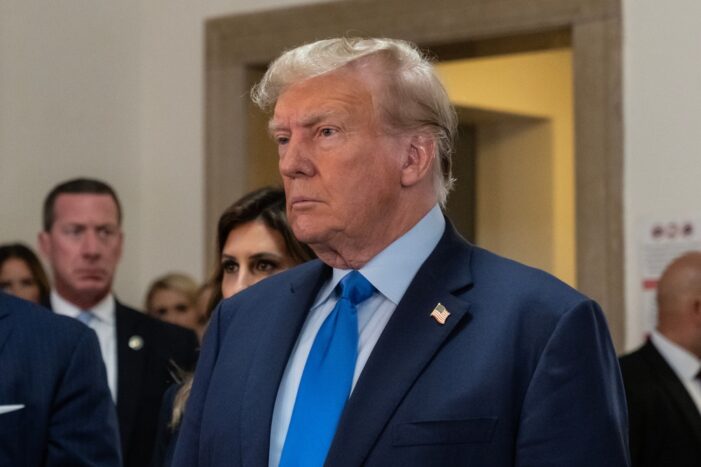Editorial credit: lev radin / Shutterstock.com
By Aaron Reichlin-Melnick | November 5, 2023
This op-ed is part of a series exploring what a second term would look like for either President Biden or former President Trump.
Four years after he was elected on the promise to “build the wall,” Donald Trump left office with border apprehensions at their highest level in a decade, most of his immigration regulations stymied in court and Immigration and Customs Enforcement (ICE) still struggling to reach the deportation highs of the early Obama years.
Now, as Trump campaigns for a return, he is promising a second term with no holds barred. Though many of his promises are bluster, his four years in office are hard evidence that any administration dedicated to reducing all types of immigration has a lot of tools at its disposal to do so.
A future Trump administration could be most successful in cutting legal immigration, which he promises to do. He pledges to restore and expand the so-called “Muslim Ban,” this time barring immigration from even more countries. He could also use that authority to impose other sweeping immigration bans, making it harder for legal immigrants of all kinds — much as he did in his first term. And he could bring back the “invisible wall,” policies designed to throw sand in the gears of our legal immigration system and bring it down by attrition.
If legal immigration levels are cut dramatically, it would likely exacerbate our serious national labor shortage and make the U.S. a less desirable destination for the world’s best and brightest.
At the border, Trump is eschewing practical solutions in favor of picking a fight with our largest trading partner, Mexico. He has called for a “naval blockade” of Mexican commercial shipping ports and designating drug cartels as “enemy combatants” to permit U.S. military attacks. Both acts could be egregious violations of international law and might even be an act of war. But without meaningful alternative legal pathways, crackdowns alone will not stop migrants from seeking safety and a better life.
Absurdly, Trump wants to bring back “Remain in Mexico,” the policy that forced nearly 70,000 migrants to wait in life-threatening conditions for asylum hearings. Maybe he thinks he can do a repeat of 2019, when he threatened 25 percent tariffs to get “Remain in Mexico.” But 2019 was before inflation became a national issue — today, a 25 percent tariff on Mexican goods would be politically and economically suicidal. Mexico has vowed never to restart the program, and an empty tariff threat is unlikely to get a Mexican president to reconsider.
Inside the U.S., Trump wants to carry out “the largest domestic deportation operation in American history” and to “end birthright citizenship,” which would entail stripping citizenship from tens of millions of Americans born to undocumented parents and creating a permanent immigrant underclass.
Of course, Trump already promised in 2016 to deport all 11 million undocumented immigrants, and he obviously failed at that. With immigration court backlogs higher than they’ve ever been and ICE’s border-related obligations demanding the lion’s share of its resources, a second Trump administration would likely struggle even to match the deportation levels of his first term.
Even if such a mass deportation operation were feasible, deporting 3 percent of the U.S. population would have devastating effects. Countless families would be torn apart; our economy would go into a free-fall; and our core principles of justice, mercy and freedom would be damaged irreparably.
To get around the realities of the immigration system, Trump’s immigration hawks promise to think creatively. In February 2020, I described their use of “hidden weapons” in immigration law — unused or rarely used plenary powers and emergency authorities sitting there for a president eager to break norms. One month after I wrote that, his administration found an obscure public health law that had been gathering dust for more than a century and created Title 42.
Now, Trump wants to dust off another archaic law: the 1798 “Alien Enemies Act,” used by President Roosevelt to round up 125,000 Japanese Americans and send them to internment camps. He has floated invoking this law to round up “gang members” and deport them without pesky due process. This would be illegal — for one thing, the law applies only during times of war against another “foreign nation or government.” It would also lead to widespread racial profiling, violating the constitutional rights of innumerable U.S. citizens.
Any administration willing to use one of the most infamous laws in U.S. history illegally would clearly be unrestrained in its efforts to find and use as many “hidden weapons” against immigrants as it can. And unlike in his first term, the courts may not be able to step in at the last moment. In 2020 and 2022, the Supreme Court heavily restricted federal courts’ abilities to block most immigration enforcement policies. This year, the Court also restricted the ability of states to block immigration policies. These decisions make it harder for courts to step in before the damage is done.
Of course, any president’s ability or inability to cut immigration and crack down on the undocumented population is contingent on the status quo continuing in Congress. Our legal immigration system predates the World Wide Web, and our humanitarian protection system is from Bill Clinton’s first term.
While there are limits to what any president can achieve with “scorched earth” immigration policies, bringing the aging immigration system to its knees is, sadly, feasible. If neither party blinks, the future of immigration policy will be a see-saw, tilting wildly back and forth whenever the White House changes hands. That kind of chaos benefits no one.
Aaron Reichlin-Melnick is policy director at the American Immigration Council.

